Getting your kids involved in cleaning can be both fun and educational. Start by turning chores into games, like Clean Your Room BINGO or scavenger hunts. Establish a routine, perhaps right after playtime, to help them understand the importance of tidiness. Use timers to create excitement and reward participation with small incentives, like extra screen time. Emphasize teamwork and make the process enjoyable by playing music or celebrating completed tasks. Teaching them about germs and hygiene during these activities adds a valuable lesson. There's so much more to explore on how to make cleaning a positive experience for everyone.
Importance of Involving Kids
Involving kids in cleaning chores is like planting seeds for their future—it's essential for fostering responsibility and important life skills. When you encourage your children to take part in cleaning tasks, you're not just tidying up; you're teaching them valuable life skills that will serve them well into adulthood.
Surprisingly, only 28% of parents require their children to help with household chores, leaving a significant opportunity for instilling accountability and independence. By implementing daily cleaning routines, you can create a structured environment that helps children understand the importance of maintaining a tidy space. Additionally, establishing a personalized cleaning schedule can further enhance their understanding of responsibilities over time.
By engaging your kids in these activities, you help them develop a strong work ethic and time management skills, significant for future responsibilities. Kids learn that completing cleaning tasks isn't just about getting things done; it's about working together as a family. This teamwork enhances family bonding and creates a sense of accomplishment that boosts their confidence.
Moreover, teaching kids to clean from a young age prevents them from entering adulthood without basic household management skills. By fostering these abilities early on, you're promoting self-sufficiency and preparing them for the challenges of independent living. Additionally, incorporating time-saving strategies into their cleaning routines can make the process more enjoyable and efficient for everyone involved.
Strategies for Engaging Kids
Engage your kids in cleaning by turning chores into fun activities. Incorporate games like Clean Your Room BINGO or scavenger hunts to make cleaning fun. Break down tasks into manageable steps, giving specific instructions so your kids know exactly what to do, avoiding any overwhelm. For example, using microfiber gloves can make dusting easier and more effective. Additionally, consider using multi-purpose cleaners that can simplify the cleaning process for kids by reducing the number of products they need to handle.
Use a timer to spark excitement and challenge them to finish their cleaning within a set timeframe. This transforms cleaning into a fun race against the clock! Encourage teamwork by assigning individual tasks to each family member during cleaning sessions. This way, everyone contributes, fostering a sense of community and shared responsibility.
Moreover, offer incentives to motivate your kids. Extra screen time or small rewards can reinforce the value of hard work and make them enthusiastic to participate in cleaning tasks. Additionally, consider implementing a structured cleaning schedule that reinforces consistency and helps everyone understand their responsibilities.
By using these strategies, you'll not only teach your kids important skills but also create a positive atmosphere around chores. The key is to make cleaning enjoyable, ensuring your kids develop a sense of pride in their contributions.
With these strategies, you'll help them view cleaning as a fun and rewarding activity rather than a chore.
Timing for Effective Cleanup
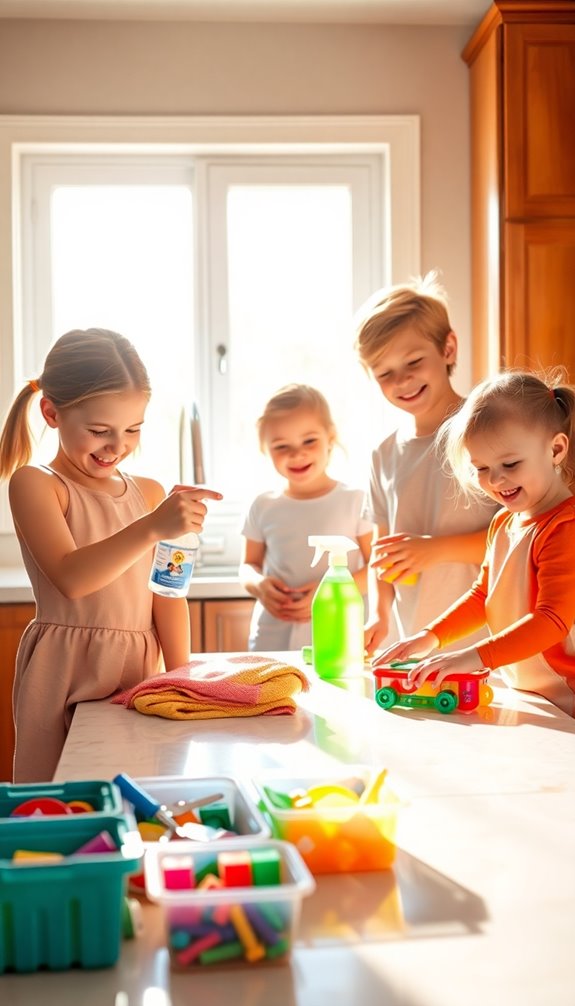
Timing plays a significant role in making cleanup effective and enjoyable for kids. The best times to engage them are right after playtime or meals. Kids are usually more receptive during these shifts, making it easier to implement your game plan.
Pay attention to your child's "health zones"—green, yellow, and red—to identify when they're most ready for cleanup. Establishing a routine that incorporates cleanup tasks at specific times each day can create consistency and reduce resistance. Kids thrive on predictability, and knowing cleanup is part of their daily schedule can make it feel less like a chore. Additionally, involving kids in daily cleaning habits can foster positive attitudes towards chores. Implementing a quick evening tidy-up routine can also help reinforce the importance of maintaining a clean space.
To make the process manageable, use laundry baskets or bins for sorting items. This visual aid not only organizes the mess but also makes cleanup feel more like a game.
Focusing on one area at a time can further simplify tasks, reducing clutter and enhancing effectiveness. You can also involve kids in establishing a cleaning routine by assigning age-appropriate chores that fit their ability and keep them engaged.
Teaching Responsibility Through Communication
When you clearly communicate cleaning tasks to your kids, you set the stage for them to take responsibility. Use simple, direct language to explain what needs to be done, ensuring they understand their duties. Encourage them to ask questions if they're unsure. This open dialogue fosters a sense of ownership over their responsibilities.
Highlight the benefits of cleaning, like how a tidy space feels and the sense of accomplishment that comes from completing a task. This teaches responsibility by showing them that their efforts lead to positive outcomes. Incorporate positive reinforcement; when they do well, praise their efforts. This motivation encourages them to participate actively in cleaning tasks. Additionally, involving them in cleaning high-traffic areas promotes a sense of teamwork and shared responsibility. Regular cleaning routines can also help them learn to manage their time effectively, which is a valuable skill.
Sharing personal stories about your own cleaning challenges can also help them relate. It emphasizes that everyone faces obstacles and that practice leads to improvement. For example, you can mention how you learned to clean kitchens more efficiently by breaking tasks into manageable steps.
Establishing routines for chores not only reinforces accountability but also builds their time management skills. By communicating effectively and consistently, you're not just teaching them to clean; you're instilling a deep sense of responsibility that will serve them in many areas of their lives. Additionally, creating a clean space can boost employee productivity by up to 12%, reinforcing the idea that cleanliness leads to positive outcomes.
Creating a Positive Cleanup Experience
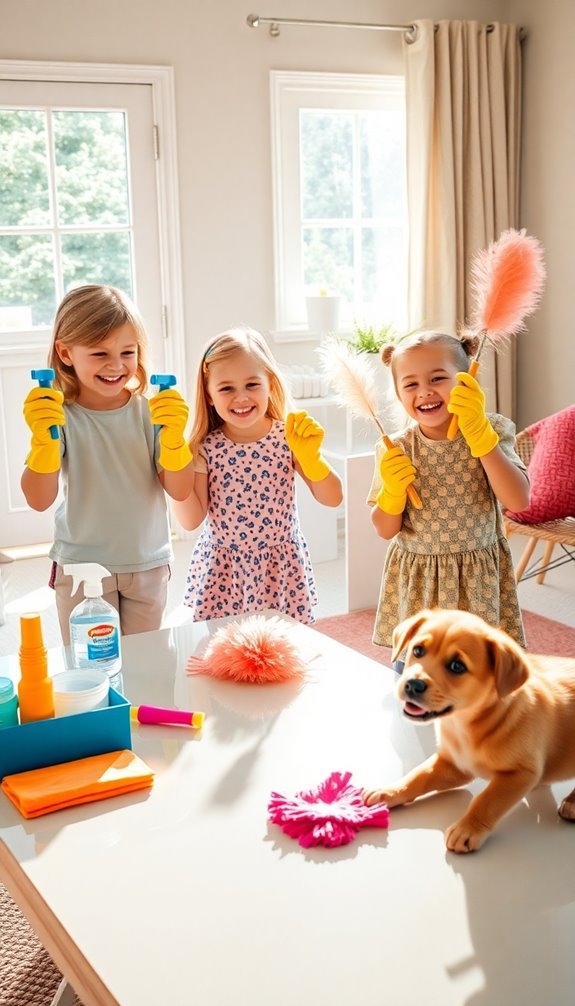
Cleaning doesn't have to be a dreaded chore; it can actually be a fun and engaging experience for kids. By modeling cleanup behavior yourself, you show them that cleaning is an essential part of life. Keep a positive attitude, and you'll encourage their cooperation. Regular deep cleaning is important for home maintenance, and involving kids can make it more manageable.
Establish non-negotiable cleanup routines that frame cleaning as a natural extension of playtime, making it a regular part of family activities. Regular use of specialized tools can also help make cleaning easier and more effective.
Here are some ways to create a positive cleanup experience:
- Incorporate fun elements: Use music or create games to make cleaning more enjoyable.
- Celebrate small successes: Acknowledge completed chores to foster a sense of accomplishment.
- Create a collaborative environment: Work together as a family to strengthen bonds and share the responsibility. This teamwork can also lead to more effective cleaning techniques that benefit everyone involved.
- Use playful incentives: Consider rewards for finishing tasks, turning cleanup into a fun challenge.
Additionally, fostering a culture of cleanliness at home can cultivate lifelong habits in children, encouraging them to value consistent cleanliness as an important aspect of their daily lives.
Benefits of Chores for Kids
Getting your kids involved in chores isn't just about keeping the house tidy; it's a chance for them to learn responsibility and independence.
By participating in household tasks, they build essential life skills and strengthen family bonds.
Plus, these experiences can set them up for success in school and beyond.
Fostering Responsibility and Independence
Chores aren't just tasks; they're valuable lessons in responsibility and independence for kids. By involving your children in household tasks from a young age, you help them develop essential skills that will serve them well throughout their lives.
Here are some key benefits of fostering responsibility through chores:
- Building a Strong Work Ethic: Kids learn that effort leads to results, which is crucial for both academic success and future job opportunities.
- Enhancing Time Management: Balancing chores with leisure activities teaches kids how to organize their time effectively.
- Encouraging Teamwork: Collaborating on household tasks helps children learn cooperation and build relationships with siblings and peers.
- Promoting Self-Sufficiency: Regular involvement in chores prepares kids to manage their living spaces independently as they grow older.
Building Life Skills
Involving kids in household tasks can greatly enhance their life skills, setting a solid foundation for their future. When you engage in cleaning with kids, you're not just tidying up; you're teaching them the value of hard work and responsibility.
With only 28% of parents requiring chores, many children miss out on essential skills. By including your kids in chores, you help them build life skills like accountability and independence. These experiences prepare them for personal and professional responsibilities later on.
As they learn to manage their time while juggling chores, you'll notice their ability to balance tasks improving as they grow. Moreover, involving siblings in shared chores promotes teamwork and collaboration, fostering a sense of accomplishment and pride in their efforts.
Kids who participate in household tasks early on often adapt more smoothly into independent living, reducing their reliance on parents for basic skills.
Enhancing Family Bonding
Household tasks can transform into meaningful family bonding experiences when everyone pitches in together. Involving your kids in chores not only teaches them responsibility but also fosters teamwork, allowing you all to work towards a common goal. This collaborative effort strengthens family bonds and creates lasting memories.
Here are some benefits of getting your kids involved in household chores:
- Builds Teamwork: Working together on tasks encourages collaboration and enhances the sense of unity within the family.
- Instills Responsibility: By assigning age-appropriate chores, your children learn accountability and the importance of contributing to the household.
- Boosts Self-Esteem: Completing chores gives kids a sense of accomplishment, improving their self-worth and confidence.
- Encourages Communication: Chores can spark conversations, helping family members connect and share their thoughts during tasks.
Age-Appropriate Cleaning Tasks
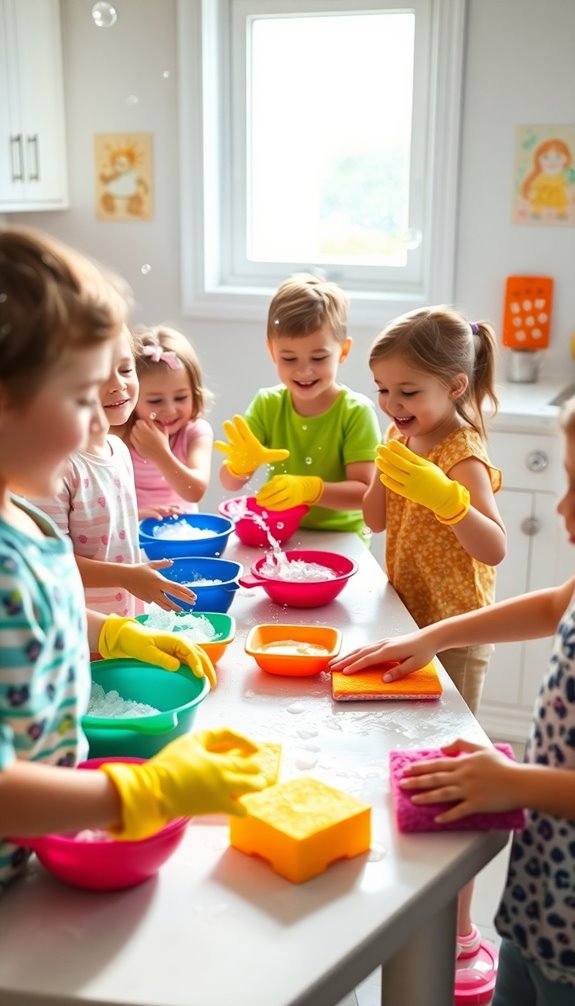
Starting early with cleaning tasks can make a big difference in your child's development. By assigning age-appropriate cleaning tasks, you help them build essential skills while fostering a sense of responsibility.
For your younger ones, consider simple tasks like sorting laundry by color or putting away toys. These activities lay the groundwork for organization.
As they progress to preschoolers (ages 4-5), they can start setting the table, feeding pets, and dusting low surfaces. These chores encourage a sense of duty and accomplishment.
When your child reaches early elementary (ages 6-8), you can introduce more complex chores like making their beds, vacuuming, and assisting you with dishes. This age is perfect for teaching kids to clean in a way that promotes independence.
In middle childhood (ages 9-12), tasks such as managing their own laundry, sweeping floors, and helping with meal prep enhance their confidence and skills.
Finally, during their teenage years (ages 13+), they should take charge of their own laundry, cooking, and cleaning their rooms. This preparation for adult life guarantees they become self-sufficient individuals, ready to tackle responsibilities on their own.
Strategies for Encouraging Participation
To get kids excited about cleaning, turn it into a game that sparks their competitive spirit.
You can also offer incentives and rewards, like extra screen time or special treats, to make participation more appealing.
Make Cleaning a Game
Cleaning can often feel like a chore, but turning it into a game can transform the experience for kids. By incorporating playful elements, you can make cleaning fun and engaging. Here are some strategies to get started:
- Clean Your Room BINGO: Create a BINGO card with various cleaning tasks. As kids complete each task, they can mark it off, making it a race to get BINGO!
- Timed Challenges: Play a cleaning playlist and set a timer for each task. Kids will love racing against the clock to finish before the music stops.
- Scavenger Hunt: Organize a scavenger hunt where kids look for items that need cleaning. This adds excitement and keeps them moving.
- Family Competitions: Encourage friendly competitions among family members, like who can clean their room the fastest. This promotes teamwork and camaraderie.
Using these ideas, you can easily make cleaning a game that kids look forward to. With a little creativity, you'll not only lighten the load but also foster a sense of accomplishment in your little helpers.
Offer Incentives and Rewards
Boosting kids' motivation to clean can be as simple as offering incentives and rewards. You can establish a points system where your kids earn points for every completed cleaning task. These points can then be exchanged for fun rewards like extra screen time, a favorite snack, or even a small toy. This approach makes the cleaning process more appealing and encourages positive behavior.
Additionally, consider creating family events or outings as rewards for achieving collective cleaning goals. This fosters teamwork and a sense of shared accomplishment among everyone in the family.
To keep track of progress, use a chore chart that visually represents completed tasks and milestones. This can inspire friendly competition, further motivating your kids to participate.
Finally, emphasize the value of hard work by linking rewards to their efforts. Help them understand that their contributions to cleaning directly impact their ability to enjoy fun activities.
Balancing Chores and Playtime
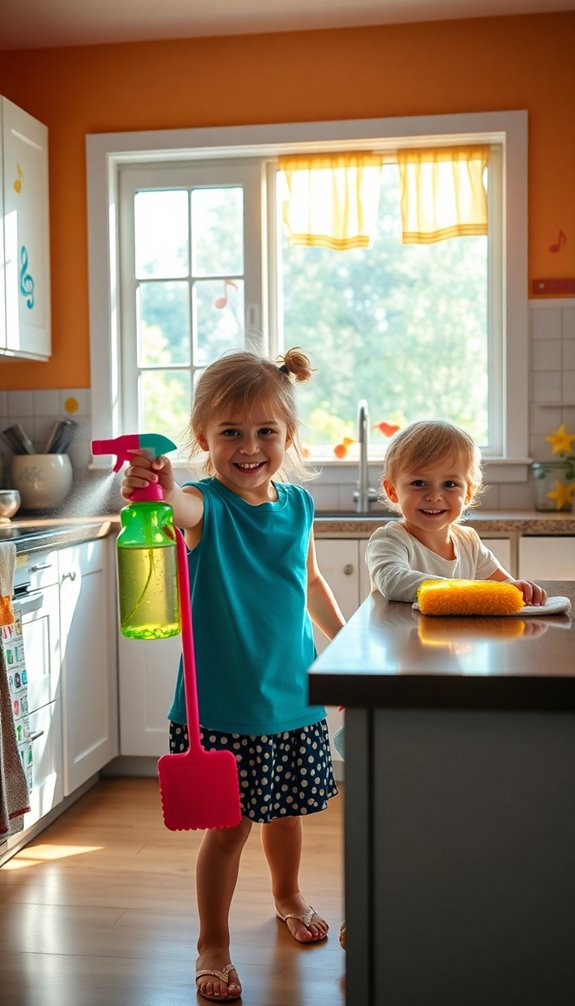
Kids often thrive when there's a clear balance between chores and playtime. Establishing a consistent schedule for chores helps your children understand their responsibilities while ensuring they still have time to play.
Designate specific chore times—like after meals or play—to minimize resistance and create a routine that fosters cooperation.
Here are some tips to help you balance chores with playtime:
- Use timers to set chore durations, helping kids manage their time effectively.
- Encourage outdoor play during chore times to make responsibilities feel less burdensome.
- Be flexible with chore completion, allowing kids to accommodate their play schedules.
- Introduce fun cleaning products that are safe and engaging for kids to use.
Understanding Germs and Hygiene
Understanding germs is key to staying healthy, and it's important for you to know that not all germs are bad.
Engaging in fun cleaning activities and learning proper hand-washing techniques can make a big difference in keeping your space clean and germ-free.
Importance of Germ Awareness
Germs are all around us, and knowing about them is essential for good health. Understanding the presence of germs helps children develop germ awareness, which fosters a sense of responsibility toward cleanliness and hygiene.
Kids often relate to the concept of "cooties," making it easier for them to grasp the importance of staying clean.
Here are some key points to share with your kids about germ awareness:
- Germs can be both harmful and beneficial, so it's important to understand their impact.
- Establishing consistent cleaning routines helps minimize germ exposure.
- Teach proper hand hygiene techniques, like washing hands for at least 20 seconds.
- Encourage kids to share their cleaning tips and experiences to build a community of germ-aware peers.
Engaging Cleaning Activities
During playtime or after school, incorporating engaging cleaning activities can turn lessons about germs and hygiene into fun experiences. You can make cleaning a game by introducing stories or books about germs, often called "cooties," to help kids understand why cleaning is vital. As they learn, they'll become more responsible for their surroundings.
Try turning chores into a mini dance party! Play your kids' favorite songs while you clean together. Singing along makes the tasks more enjoyable and helps them remember the importance of thorough cleaning.
For example, you can create a fun routine where they sing while using child-friendly cleaning products like vinegar and baking soda. This way, they're not only learning about hygiene but also about safe and eco-friendly cleaning methods.
After cleaning, establish routines like using paper towels to turn off faucets. This simple habit reinforces good hygiene practices and guarantees your kids clean up after themselves.
Proper Hand-Washing Techniques
Cleaning up around the house is just the beginning of teaching kids about hygiene. Proper hand-washing techniques are vital in reducing the spread of germs and illnesses. Make it fun! Teach your kids to scrub their hands with soap for at least 20 seconds. You can even incorporate a catchy song or rhyme to keep them engaged while they wash.
Here are some tips to guarantee effective hand-washing:
- Use soap and warm water.
- Scrub every part of your hands, including between fingers and under nails.
- Rinse thoroughly and dry with a clean towel.
- Use paper towels to turn off faucets and open doors after washing.
Establish regular hand-washing routines, especially after cleaning tasks or meals. Encourage your kids to wear cleaning gloves during chores to keep their hands protected, but remind them that washing hands afterward is still vital.
Discussing the types of germs and why hand hygiene matters can help foster a sense of responsibility. By making hand-washing a fun and educational activity, you're instilling lifelong healthy habits in your children.
Making Cleaning Engaging
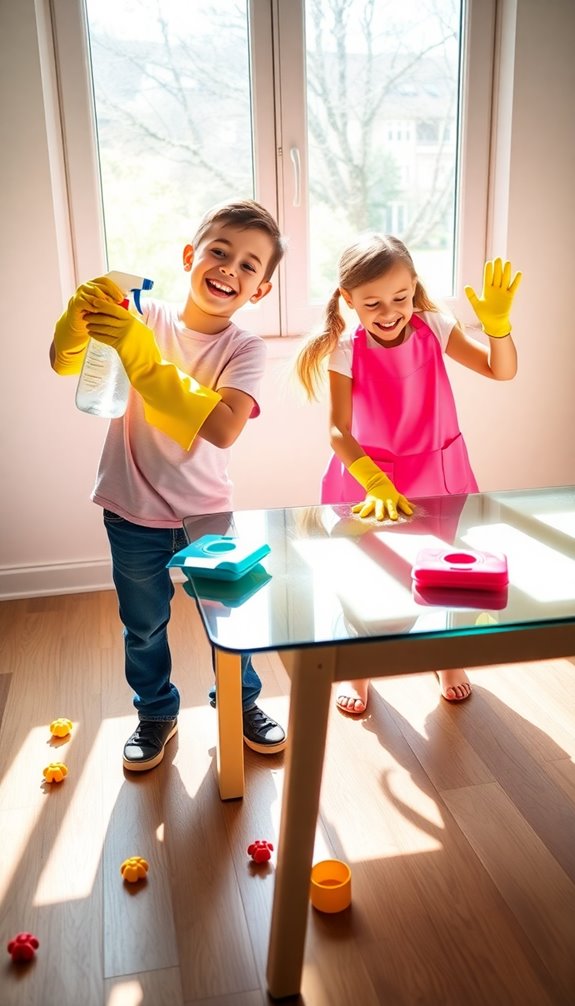
Making cleaning engaging for kids can transform a mundane chore into a fun and rewarding experience. Start by incorporating music into your cleaning routine. A lively playlist can make everyone more willing to help out.
You can also use a kitchen timer to set challenges, teaching kids about time management while adding a fun sense of urgency.
Try turning cleaning into a game, like a scavenger hunt, where kids search for items that need to be cleaned or put away. This fosters excitement and motivation during cleanup.
Assigning roles or designating a "leader" can promote teamwork, making the experience more collaborative and enjoyable.
Additionally, reading books about germs and cleanliness can deepen their understanding of why cleaning is important. This knowledge not only teaches responsibility but also makes the activity more meaningful.
Creative Cleaning Techniques
Incorporating creative cleaning techniques can take the fun of cleaning to the next level. By transforming chores into engaging activities, you'll motivate your kids to clean while having a blast. Here are some ideas to get you started:
- Follow the Leader: Play a game where kids mimic your movements as you guide them through cleaning tasks.
- Role Play: Assign specific roles and let kids wear colorful aprons or use fun cleaning tools to make cleaning feel special.
- Switch It Up: Change leaders every five minutes so everyone gets a turn to lead the cleaning adventure.
- Safe Supplies: Use child-friendly cleaning products like vinegar and baking soda, teaching kids about safe practices while they clean.
With these creative techniques, you can inspire your kids to clean while promoting teamwork and a sense of accomplishment.
Cleaning won't just be a chore; it'll be an enjoyable experience that encourages responsibility. Embrace these methods, and watch as your kids turn into enthusiastic little helpers ready to tackle any mess!
Sharing Knowledge and Tips
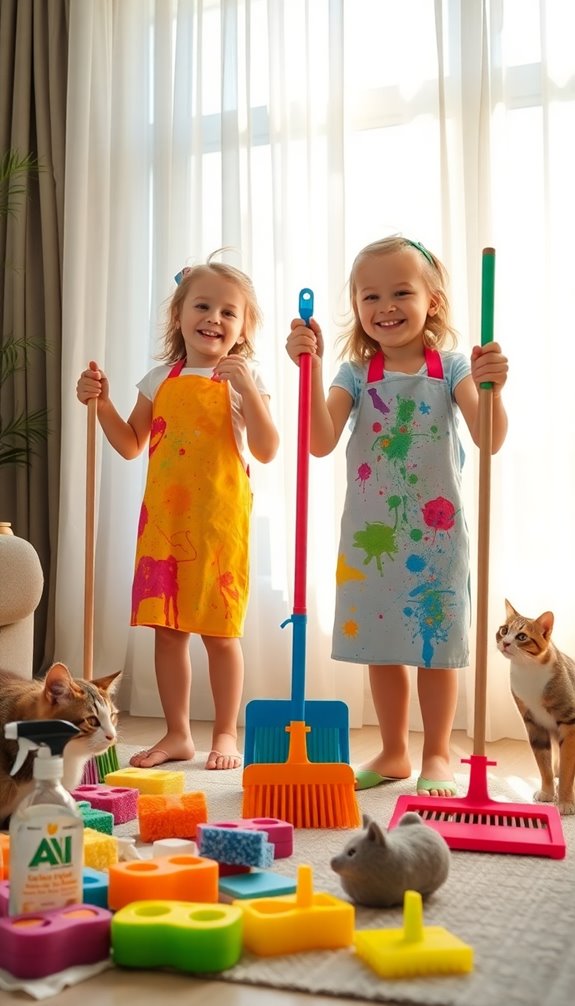
When it comes to fostering a sense of responsibility, sharing knowledge and tips about cleaning can be a game-changer for kids. Encourage your children to talk about their favorite cleaning techniques with friends and family. This not only promotes awareness of cleanliness but also inspires collaborative cleaning activities among their peers.
By creating a community of germ-aware kids, you reinforce the importance of hygiene practices in their daily lives. Engaging kids in discussions about personal cleaning experiences can lead to the development of fun and effective cleaning strategies.
When children feel ownership over their cleaning responsibilities, they're more likely to enjoy the process. Make it a routine to share stories or interactive activities around cleaning; this can turn sharing knowledge into a fun part of their day.
Don't underestimate the power of creativity! Let your kids suggest new ways to keep things tidy and share their insights with others. This involvement not only builds a sense of pride but also cultivates ongoing conversations about cleanliness, making it a shared journey towards a cleaner environment.
Conclusion
Involving kids in cleaning not only teaches them responsibility but also fosters a sense of teamwork. Did you know that children who help with chores are 20% more likely to develop strong life skills? By making cleaning fun and engaging, you create lasting habits that benefit everyone. So grab some supplies, turn up the music, and watch your kids transform cleanup into a joyful experience. Together, you'll not only tidy up but also build valuable skills for the future.